When the timing, draw, bounces and breaks somehow start falling your way in a competition that lacks consistent rhythm, rhyme or reason by design, the British traditionally ask whether that means “your name is on the cup.” Maybe only destiny can inject a bit of order into the mayhem. It provides a narrative foundation for the chaos that unfolds during a season-long, multileague, single-elimination tournament.
The cliché hasn’t migrated across the Atlantic like so many other football Britishisms, but the feeling has. How else could we explain what’s happening in California’s capital, a city so often overshadowed by its cosmopolitan neighbors to the west and south? Sacramento Republic, a nine-year-old USL Championship club whose bid for MLS membership disintegrated during the pandemic, is now 90 minutes from the most improbable trophy engraving in the U.S. Open Cup’s 109-year history.
After missing the USL playoffs in 2021, Sacramento retooled and reloaded. This year, as the Open Cup returned from a two-season hiatus, Republic defeated the San Jose Earthquakes, LA Galaxy and Sporting Kansas City during a six-game run to Wednesday’s final. There, it’ll play host Orlando City for the trophy, title and a spot in next season’s Concacaf Champions League. Only two lower-tier sides had beaten three MLS foes in one Open Cup campaign before Sacramento, most recently in ’05. No lower-division team has reached the final since ’08, and none have won it since the 1999 Rochester Rhinos.
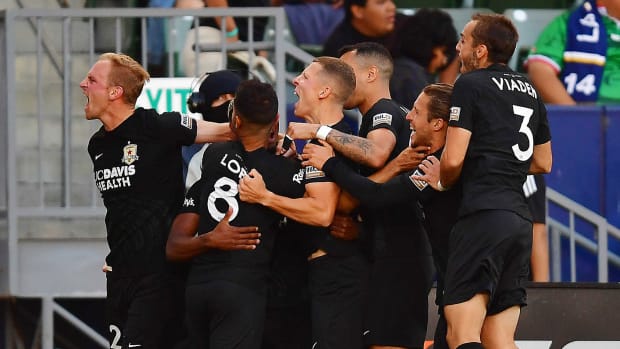
Gary A. Vasquez/USA TODAY Sports
But those were very different times. Republic’s run arguably stands alone. To put the changing landscape in some perspective, when the Charleston Battery ousted two MLS sides and made the 2008 final, there were only eight MLS players, including Designated Players, who earned at least $439,000. That’s now the average senior salary for non-DPs in the 28-team league. The gulf between MLS and the rest has widened considerably. Sacramento’s achievement is already remarkable. Club president and GM Todd Dunivant estimated that, on average, MLS clubs spend 20 times more on their first-team rosters than their USL Championship counterparts.
Perhaps the only way to explain this is that Republic’s name is on the cup.
Dunivant, 41, is a serial winner, a five-time MLS champion with LA and San Jose and then an NASL titlist as an executive with the short-lived San Francisco Deltas. He knows a bit about championship formulas, and so took a stab at explaining how Republic has managed to beat the Open Cup odds so comprehensively.
“Just to see what we’ve gone through, what the city’s gone through, what the front office has gone through, what our fan base has gone through—the ups and downs. That’s genuinely what it’s all about and overcoming those obstacles—that is the heart and soul of who we are,” he says. “The word indomitable—you’re going to hear it over and over, but that’s who we are. For me, there’s nothing better in sports than being able to see an obstacle, expect adversity and be able to tackle it.”
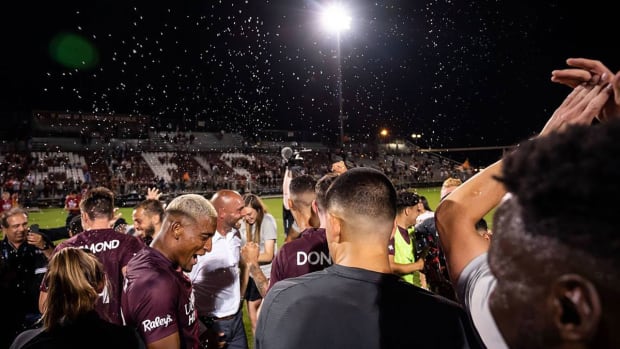
Xavier Mascareo/Imago Images
Republic’s club logo includes the city motto: “Urbs Indomita.” It was a prophetic design choice and it’s become the backbone of the team’s identity. The notion of Open Cup destiny gains a bit more traction when you consider that 2022 originally was intended to be Sacramento’s first year as an MLS city. It was supposed to be facing the big boys every weekend. Instead, Republic’s journey was postponed by the pandemic and then derailed when investor Ron Burkle pulled out in February ’21. It was a shocking and demoralizing turn of events, and there were concerns about the club’s future. Would supporters and sponsors stick around if MLS was off the table? Would owner Kevin Nagle, who retained control once Burkle backed out, continue to ante up?
“When something like that happens that’s so jarring, it shakes everybody to their core,” Dunivant recalled. “What happened straight away was Kevin’s commitment was massive, to be able to come to our staff, and I think we were on Zoom at the time … and Kevin came on and said, ‘Hey, I’ve got this. We’ve got this. We’re not going anywhere and we’re going to keep at it.’ And I think just hearing that gave everybody a lot of comfort.”
Nagle doubled down, continuing to invest in an academy that’s robust by USL standards (it’s already produced several pros, plus three MLS Next semifinalists in the past two seasons) as well as the roster overhaul that fashioned an Open Cup finalist and a likely return to the USLC playoffs. Dunivant and coach Mark Briggs added at least 16 new players to the Republic roster as the club climbed from around the middle into the top quartile in league spending. Among the key new faces are goalkeeper Danny Vitiello—the USLC’s 2020 Golden Glove winner—Irish defensive stalwart Lee Desmond and co-leading scorer Douglas Martínez, a former Real Salt Lake forward who’s been capped four times by Honduras.
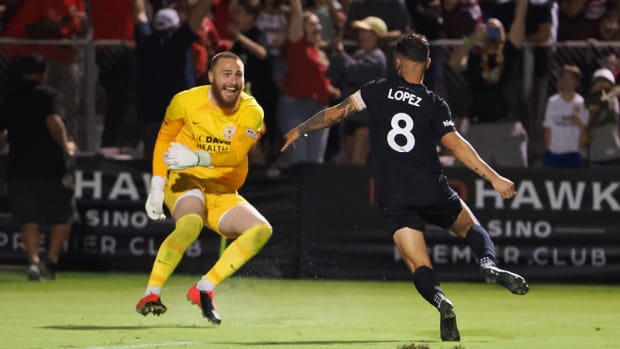
Kelley L Cox/USA TODAY Sports
And then there’s Rodrigo López, the Mexican American veteran who’s experiencing a career rebirth in his third stint in Sacramento. The 35-year-old attacking midfielder is tied for the Open Cup scoring lead with four goals and has been a true talisman for a side that desperately needed an injection of leadership, confidence and character. Republic has become clutch, tough to score on and tough to beat, and that’s how you navigate a bracket that includes bigger, more skillful opponents.
“He loves Sacramento. We worked out a deal with [Rio Grande Valley Toros in January] and were able to bring him back, and honestly he’s playing the best he’s ever played in his career,” Dunivant said of López. “Quickly in preseason, he earned the captaincy, and Mark gave him the reins to lead the team. And he’s been tremendous all year.”
When the club commissions the first statue outside the new 12,000–15,000-seat downtown Sacramento soccer stadium that Nagle has promised to build, it’ll be of López. The only question left is whether he’ll be holding a bronze version of the Open Cup trophy.
Watch soccer live with fuboTV: Start a free trial today!
Sacramento isn’t Hollywood, of course, and Republic’s name may not be on the cup—just like Charleston’s wasn’t 14 years ago. Orlando has no interest in being just the final boss or foil in Sacramento’s Cinderella story. The Lions can tell a similar tale, in fact. Orlando was a soccer city that few expected to rise to prominence, but the club attracted record-setting support and won two USL championships before moving to MLS in 2015. To whatever extent a team can “earn” its way into MLS, Orlando City did.
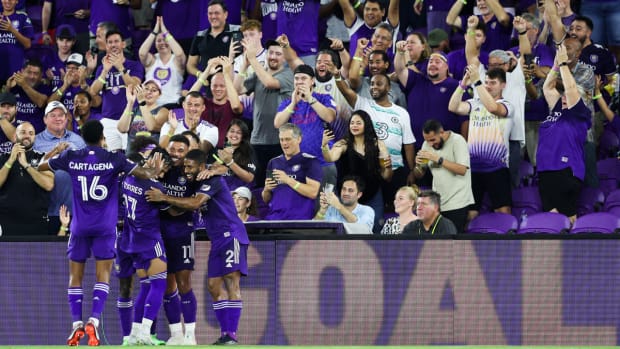
Nathan Ray Seebeck/USA TODAY Sports
Adversity followed, however. Orlando failed to make the playoffs through its first five MLS seasons as three head coaches came and went. Finally, Óscar Pareja arrived ahead of the 2020 campaign. City’s fortunes reversed under the former architect of FC Dallas’s player development juggernaut. The Lions finished runner-up at the ’20 MLS is Back Tournament, posted two straight winning regular seasons and are in good shape for a third consecutive playoff berth. But there’s been no significant trophy since the ’13 USL championship, and the club and its fans, who, like Sacramento’s, have endured their share of frustration, will be desperate for success Wednesday.
Following Open Cup wins over the rival Tampa Bay Rowdies and MLS Eastern Conference leader Philadelphia Union, Orlando survived penalty shootouts against Inter Miami and Nashville SC and then blasted the New York Red Bulls, 5–1, in July’s semifinal. After all that plus the past eight years, City must believe its name is on the cup.
“It’s going to be hostile inside the stadium. We know that. We know Óscar has been in this tournament before and lifted the trophy. He’s a fierce competitor,” Dunivant said. “There’s no question that we’re going to have a huge challenge against Orlando in their house. The cool part for us, is our guys have stepped up every time these challenges have been thrown at them.”
The indomitable ethos will remain, win or lose. The USL Championship is growing, standing on its own as an independent national league as MLS reserve teams decamp to MLS Next Pro. Stadiums and brands are being built, games are on ESPN and further expansion is around the corner. It’s a circuit in which Republic, which represents the nation’s 26th-largest market, can prosper. An ascent to MLS would require a billionaire backer—not to mention a commitment from the first-division league to expand beyond 30 members (St. Louis City will be team No. 29 next year, and Las Vegas remains the clear front-runner for 30). And although Dunivant said the club remains interested in talking with potential investors, its focus is “squarely on the here and now.”
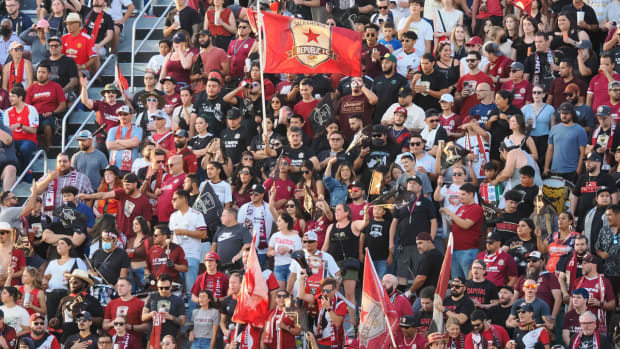
Kelley L Cox/USA TODAY Sports
He said, “We think that’s why we’ve had success again—because we’ve sort of refocused and put the attention for all of our players, staff and fans on this team and this city and this moment. We think good things happen from there. Now you see what Sacramento’s capable of yet again.”
It could’ve turned out differently. Republic’s current run of form—not to mention its very existence—wasn’t fated. But the club powered through its downturn, returned to its roots and then reached a different sort of height. It couldn’t join MLS, so it’s beating it.
“The excitement around the team—anyone who left is back now, and then some. That speaks to the market and that, hey, it doesn’t matter what league we’re in,” Dunivant said. “It’s pretty wild how big this has gotten and how many people identify with it and are excited by it. I think for us, what’s been most satisfying is the people within these walls, within the club and with our fans that have suffered, that went through the pain of last year, to be able to enjoy this.”
The future feels certain regardless of Wednesday’s outcome. Republic will remain. Now it can focus on making history.







